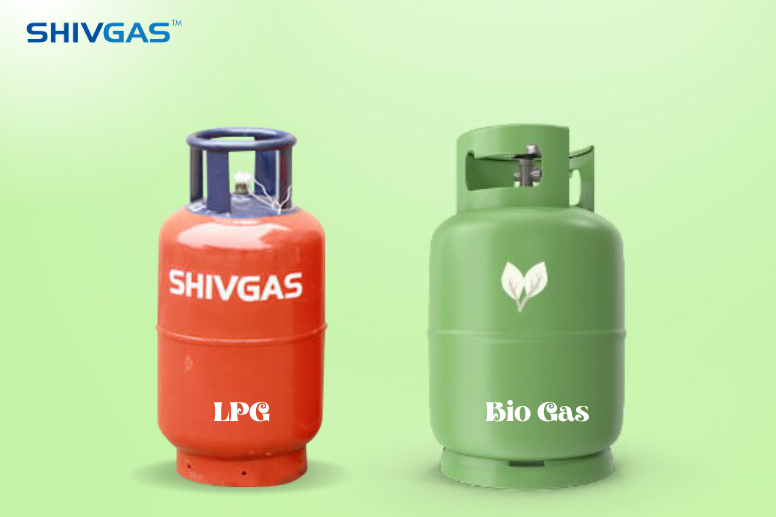
As we are moving forward towards a sustainable and carbon-neutral environment, the efforts to replace traditional fossil fuels such as coal, kerosene, and petrol with fuels like LPG and Biogas is gaining momentum. Both have unique characteristics and advantages that position them as preferred choices in today’s energy mix. However. consumer often find them perplexed by the thought of which one is better, and holds more potential in the long term.
Well, the answer depends on a lot of factors, such as ease of use, reliability, carbon emission, and so… So, as a leading LPG gas company with numerous LPG gas dealerships associated across eastern India, we have thought to put light on these two gases, and is LPG better than Biogas?
Let’s get into it!
Liquified Petroleum Gas has become an indispensable fuel for almost all industries encompassing residential, industrial and commercial sectors. Renowned for its cost-effectiveness, eco-sensitivity and safe use, it is now everyone’s go-to choice for continuous and reliable operations.
Extracted during petroleum refining, LPG contains a mix of Propane and Butane. Its clean burning nature not only curtains greenhouse gases but also mitigates air pollution, marking it as a pivotal player in our sustainable energy arsenal.
In renewable energy, Biogas emerges as a beacon of hope, produced from anaerobic digestion of organic matter. The breaking down of animal waste or food by microorganisms in the absence of oxygen in a closed environment is known as an anaerobic reaction, which leads to the production of biogas, primarily composed of Carbon dioxide and methane. Biogas is a renewable resource, and its burning does not pollute the environment as much as coal and kerosene. It finds applications in several agricultural and cooking fuel uses.
LPG is produced as a byproduct during the refining process of natural gas or crude oil refineries. Once extracted the oil undergoes purification and liquefaction to remove impurities and compress it into a liquid format for ease of transportation.
Biogas has a different process of production. The production process begins by mixing organic waste such as cow dung, other animal manure, food waste are mixed with water and crushed into small particles and then slurified to prepare for anaerobic digestion process. In the digestor the bio-waste is heated around 37 degrees where the microbial action begins. The microbes turns the protein, carbohydrate, and lipids into methane and carbon dioxide which is than used as fuel for cooking and other application.
LPG is Liquified petroleum gas, the liquified form of the gas is transported through gas pipelines and in cylinders of various sizes starting from 5Kg to 450Kg bulk cylinders.
Biogas is transported through gas tanks in which the gas is kept under low pressure. For mass distribution, it can be upgraded to biomethane, which is similar to natural gas and can be distributed through dedicated pipelines.
When it comes to accessibility and availability of LPG, the wide distributor network of LPG gas dealership is responsible for ease of delivery even in the remotest corner. LPG production takes place in larger scale which is why, there is continuous distribution network ensuring uninterrupted supply, making it accessible for anyone anywhere.
Biogas is not as accessible as LPG, this is due to the infrastructural challenges. The implementation of transforming of organic waste into renewable energy is still in it’s initial phases and it takes anywhere from two weeks to a couple of months to transform organic waste into fuel leading to it’s lack of availability and accessibility.
LPG is quite widely used as commercial, industrial and residential purposes. It is commonly used for heating, cooking, refrigeration, hot water system, auto LPG and in various industrial processes such as metal melting, pharmaceutical, plastic, etc.
Biogas has still limitation when it comes to versatility in application. Commonly used as cooking fuel, biogas is mostly used for heating, cooking and lighting in households.
LPG burns relatively cleaner than any other fossil fuels such as coal or diesel. The combination of propane and isobutane when burnt it produces water and carbon dioxide, the byproduct of burning LPG produces a smaller concentration of hydrocarbon making it a safer and cleaner fuel than others.
Although biogas does not produce harmful greenhouse gases during burning, it is important to consider if biogas infrastructure does not filter out impurities it can have harmful environmental impact. The corrosive nature of gases such as Hydrogen Sulphide and Sulfur Dioxide emissions can be 10x more toxic than natural gas.
As we have understood through this blog, both gases have their own benefits, but as customer what should you pick? Currently, LPG is better choice and the reason for this is ease of installation, transportation, availability and reliability.
It is easier to find an “LPG gas dealership near me” than to find Biogas distributor. Biogas can become a credible and reliable source in the upcoming future, but currently we don’t have technologies and infrastructure in place to cater to the larger market.
SHIVGAS- Leading The Transformation of Greener Tomorrow
As a private gas company, we are the torchbearers of greener tomorrow. For this, SHIVGAS supplies propane rich LPG that leads to lower pollution, and has stringent quality testing in place to ensure premium LPG supply to industrial, commercial and residential users.
Our strong and wide network of LPG gas dealership and vast fleet of transportation trucks allows us to be a reliable LPG supplier. Want to be part of this growing LPG network? Join us as distributor by filling up the dealership form.
Comment (0)